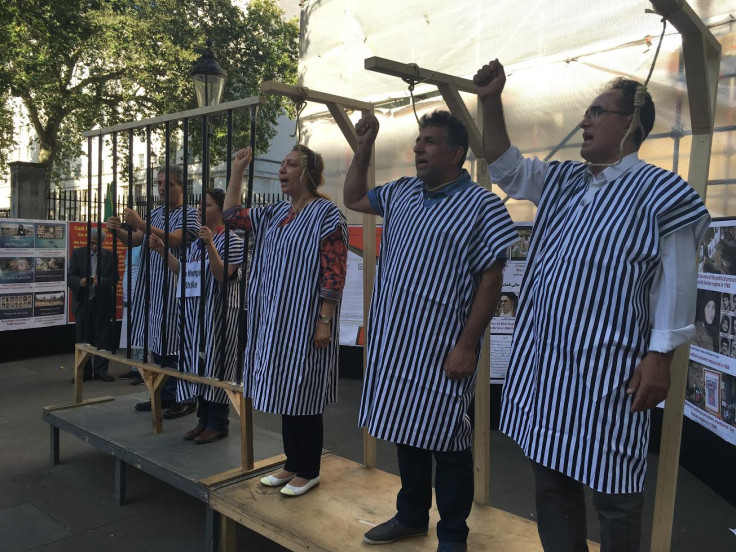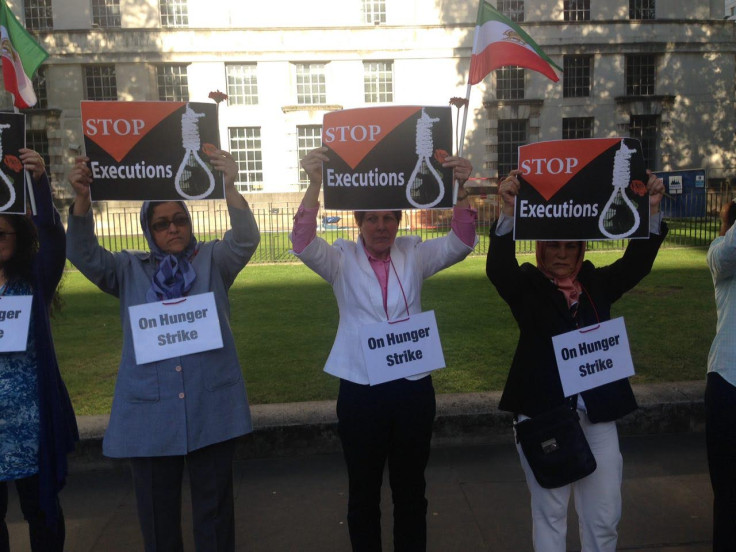Protesters undertake hunger strike outside Parliament in solidarity with Iran's political prisoners
The demonstration came less than a week after 20 people were executed in the Islamic Republic.

Protesters in the UK went on hunger strike for three days in solidarity with Iranian political prisoners on the anniversary of the 1988 massacre in the Islamic Republic.
The hunger strikers were joined by scores of other demonstrators as they stood outside Parliament demanding the UK government speak out against the treatment of current political detainees.
They also called for the government to recognise the victims and perpetrators of the 1988 massacre in Iran, in which state-sanctioned killings of political prisoners were carried out over several months leaving thousands of people dead.
In a statement, the Association of Iranian Political Prisoners, UK, said: "The participants urge the UK government to categorically condemn incessant cruel hangings and act with its western allies for an immediate halt to the executions and torture in Iran.
"They also call on the UN Human Rights Council and the UN Security Council to form an international court to prosecute the officials of the regime responsible for these crimes."
Many taking part in the three-day demonstration that concluded on 8 August and included an exhibition of the regime's human rights abuses and a mock execution were related to people who had been imprisoned or killed in Iran.

One of the hunger strikers, 18-year-old Omid Ebrahimi, said: "My dad was very active in Iran and spent 10 years in prison there.
"He was there at the time of the 1988 massacre and he whenever he talks about the memories he had and the friends he had that were taken from him and executed during this massacre I am astounded.
"Four of my mum's relatives were executed by the regime – two during the massacre – and all of this motivates me to follow in the footsteps of my parents, because they are trying to raise awareness of the fact the regime is still there – many high ranking members who took a leading role in the massacre still hold key positions in the hierarchy of the regime."
Another demonstrator, Naghmeh Rajabi, 29, who spoke to IBTimes UK during the third day of her hunger strike, said: "It is personal because I was victim of Iranian regime. My aunts were executed by the Iranian regime and I never got to meet them and it's a person thing for me.
"Living in a free society as an Iranian woman in exile, it is my responsibility to speak for the women who don't have a voice and don't have the basic minimum human rights."
The demonstrators not only called for those who took part in the 1988 massacre to be held accountable, they also wanted to raise awareness of the plight of people currently being held in prisons in Iran.
Their protest came less than a week after the execution of 20 Kurdish Sunni political prisoners in the country's Gohardasht (Rajai-Shahr) Prison, which saw the families of the victims told to come and say goodbye to their relatives before 3pm on 2 August – only to find their loved ones had been executed by the time they arrived.
UK spokesperson for the National Council of Resistance of Iran (NCRI) Hossein Abedini said: "The situation inside the prison where the recent executions took place is very worrying and many people, many prisoners are on hunger strike there and there is very tight security.
"There is a very worrying situation if the silence continues and robust measures are not introduced immediately."
Despite going without food for three days to raise awareness of the situation in Iran, Ebrahimi said the demonstrators were in good shape compared with prisoners in Iran.
"We are on hunger strike with political prisoners who are also on hungers strike, but they are in worse conditions, they are tortured they are awaiting executions and we are doing it in a country where we are out of harm's way and we are not under threat," he added.
© Copyright IBTimes 2025. All rights reserved.






















